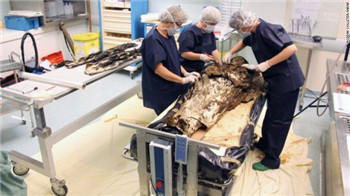(单词翻译:单击)

Archaeologists in France have unearthed the extraordinarily well-preserved corpse of a 17th-century noblewoman -- still dressed in her dress, bonnet and shoes。
法国考[微博]古学家发掘一具17世界贵妇遗骸,遗体上依旧穿着长袍以及鞋帽,保存完好。
A team from the French National Institute for Preventive Archaeological Research discovered the body when they pried open her lead coffin during a rescue excavation on the construction site of a new conference center in Rennes in northwestern France。
在法国西北城市雷恩的新会议中心建筑工地上,法国国家考古人员研究所的一组人员在抢救性挖掘时发现了这具遗体,并撬开了这座铅质棺椁。
"When we opened the coffin (we) saw a body, a lot of volume of fabric, the shoes," said anthropologist Rozenn Colleter, who is part of the team. "We didn’t know how well-preserved she was until we scanned her."
“打开棺椁,我们看到了遗骸,里面还有大量织物和鞋子,”小组成员考古学家罗森·柯莱特说道,“我们并不知道她到底保存的怎样,只有等到扫面之后。”
Colleter describes her as a "natural mummy -- particularly well preserved."
柯莱特描述到“自然木乃伊——保存十分完好”。
Inscriptions allowed the archaeologists to identify the nearly intact body as belonging to Louise de Quengo, Lady of Brefeillac, who died in 1656.
考古学家根据碑文基本上可以确定这具遗体的主人很可能是露易·迪昂古(Louise de Quengo),死于1656年。
Louise was buried in a cape, serge wool dress and plain shirt and leather mules with cork soles. Her face was covered with a shroud, two bonnets and a hood。
迪昂古的遗体上穿着披肩,粗缝毛衣,粗布衬衫,软木底皮革穆勒鞋。她的头上戴着帽子,脸上蒙着面纱。
Her lead coffin was first opened in March 2014. It was -- among approximately 800 graves -- found at the site, which has housed the Convent of the Jacobins since the 12th century。
她的棺椁于2014年3月首次打开。自12世纪起,这里是雅各宾派的修道院,在大约800多坟墓中,发现了她的墓地。
A lead reliquary containing the heart of her husband, Toussaint de Perrien, who died in 1649 was also discovered nearby。
在一个铅质圣骨匣里,发现了她丈夫特桑·佩雷(Toussaint Perrien)的心脏,他死于1649年,就在她的旁边。
Once the coffin was open, the team had to rush to preserve her body。
一旦打开棺椁,工作人员需要立刻保护遗体。
A unique set of circumstances had preserved the corpse for hundreds of years, but it was not embalmed so they knew decomposition would start rapidly。
独特的环境使遗体存放了几百年,但并不防腐,所以他们遗体会马上腐烂。
"We had only a few days to work," said Colleter。
“我们只有几天时间。”柯莱特说。
They collaborated with scientists from the Molecular Anthropology and Synthetic Imaging Laboratory at the University of Toulouse to scan the entire body。
他们和图卢兹大学分子人类学和合成成像实验室的科学家合作扫描整具遗体。
They also collected samples of uncontaminated human tissue and DNA and pathogens including tuberculosis. Samples could help researchers looking for a cure of tuberculosis, said Colleter。
他们还收集了未被污染的人体组织,DNA以及病原体,包括肺结核。柯莱特表示,样本可以帮助研究人员找出肺结核治愈方法。
From analysis, the scientists concluded that Louise de Quengo died from an infection。
通过分析,科学家得出结论露易·迪昂古死于传染病。
"It’s extraordinary," said Colleter of finding such a well-preserved corpse. "You have to have a lead coffin, but it has to be (hermetically sealed), without insects and the humidity has to be low. "The doctors said the body was like (one) that has been buried for two weeks, but she is 350."
“太赞了,”发现这样保存完好的遗骸,柯莱特说,“必须要用铅质棺椁,但要密封,不能有虫子,保持很低的湿度。”医生说这具遗体就像是刚下葬两周,但实际上已经350年了。”
Louise de Quengo will be reburied once all the scientific tests are completed。
当所有检测完成后,露易·迪昂古将会入土长眠。


